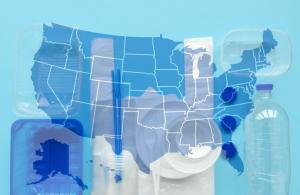
EPR Regulations: Reshaping the Plastic Packaging Industry
Understanding EPR Regulations
EPR is a policy approach that makes producers financially and operationally responsible for the entire lifecycle of their products, including packaging. This means plastic packaging producers are no longer off the hook after selling their products. EPR compels them to take a more active role in:
- Collection: Ensuring efficient collection systems are in place for post-consumer plastic packaging.
- Sorting: Facilitating proper sorting of different plastic types for effective recycling.
- Recycling/Recovery: Funding and overseeing the recycling or recovery of collected plastic packaging.
EPR and Plastic Packaging Regulations in the US
The US approach to EPR for plastic packaging is evolving. Currently, there's no federal legislation mandating EPR for packaging. As of June 4, 2024, six U.S. states have enacted legislation with a focus on Extended Producer Responsibility (EPR) for packaging materials:
California
Colorado
Maine
Oregon
New Jersey
Washington
It's important to note the distinction between full EPR Legislation, which establishes a comprehensive framework for producer responsibility, including collection, sorting, recycling, and potentially composting of covered materials (California, Maine, Oregon), and Packaging-Focused Legislation, which focuses on plastic packaging specifically, with regulations around collection, recycling, and recycled content mandates (Colorado, New Jersey).
While not yet enacted, some states like Minnesota, New York, and Washington have proposed bills to establish a more comprehensive EPR program for packaging.
Here's a quick breakdown of some state approaches:
California
California's Plastic Pollution Prevention and Packaging Producer Responsibility Act (PPPPR Act) is considered the most advanced EPR program in the US. It sets ambitious goals for reducing plastic packaging, recycling rates, and using recycled content.
Maine & Oregon
These states have established EPR programs that collect and manage covered materials, including plastic packaging.
Colorado & New Jersey
These states have implemented legislation targeting plastic packaging specifically. Colorado's program focuses on collection and recycling, while New Jersey focuses on increasing recycled content in packaging.
Does the FDA Regulate Packaging?
The US Food and Drug Administration (FDA) regulates packaging to ensure it protects food and drugs from contamination and doesn't interact negatively with the product. However, the FDA doesn't regulate the environmental impact of packaging materials.
EPR Effectiveness
The effectiveness of EPR for plastic packaging is still being evaluated in the US. Here's the potential impact:
- Increased Recycling Rates: Studies from other countries with EPR programs show significant jumps in recycling rates, often exceeding 75% for targeted materials like plastic packaging [source: The Recycling Partnership].
- Improved Recycling Infrastructure: EPR can incentivize investment in better sorting and recycling facilities to handle the increased volume of collected plastics.
- Eco-Friendly Packaging Design: Producers are motivated to design packaging that is easier to recycle or compost to minimize their financial and operational burden under EPR.
- Reduced Plastic Pollution: EPR can reduce the amount of plastic that ends up in landfills and the environment by making producers responsible for the afterlife of their packaging.
Evolving Regulations
EPR is a relatively new concept in the US, and the effectiveness of current regulations will depend on their specific design and enforcement. Program Design Matters. The structure of EPR programs can significantly impact their success. Factors like cost-sharing models and collection system efficiency play a crucial role.
Time for Change
Transforming the plastic packaging industry takes time. Realizing the full impact of EPR regulations may take several years.
Overall, EPR has the potential to be a powerful tool for reducing plastic pollution and promoting a more circular economy for plastic packaging. However, its long-term effectiveness will depend on the specific design and implementation of individual EPR programs.
The Future of Plastic Packaging with EPR
EPR regulations have the potential to transform the plastic packaging industry significantly. By holding producers accountable for the end-of-life of their packaging, EPR incentivizes innovation in sustainable packaging materials, investment in improved recycling infrastructure, and increased use of recycled content in new packaging.
EPR regulations are still in their early stages in the US, but they represent a significant step towards a more sustainable future for plastic packaging. Producers and consumers must adapt as these regulations continue to develop and expand. By working together, we can create a future where plastic packaging has a minimal environmental impact.
EPR Options For Manufacturers
EPR regulations and the accountability they impose lead to the attractiveness of plastic additive materials.
For example, Pristine® offers an easy, innovative solution for plastic manufacturing that does not require retooling or major manufacturing adjustments. It is a true biodegradation solution. Treating plastic materials with this biodegradable plastic additive helps ensure they are easier to recycle or biodegrade faster, reducing environmental harm. Manufacturers use this plastic additive to create a product that ensures efficient plastic biodegradation in standard landfills, compost sites, and marine environments.
Info. at Pristine LLC
Pristine LLC
+1 208-870-0965
info@pristine.llc
EIN Presswire does not exercise editorial control over third-party content provided, uploaded, published, or distributed by users of EIN Presswire. We are a distributor, not a publisher, of 3rd party content. Such content may contain the views, opinions, statements, offers, and other material of the respective users, suppliers, participants, or authors.


